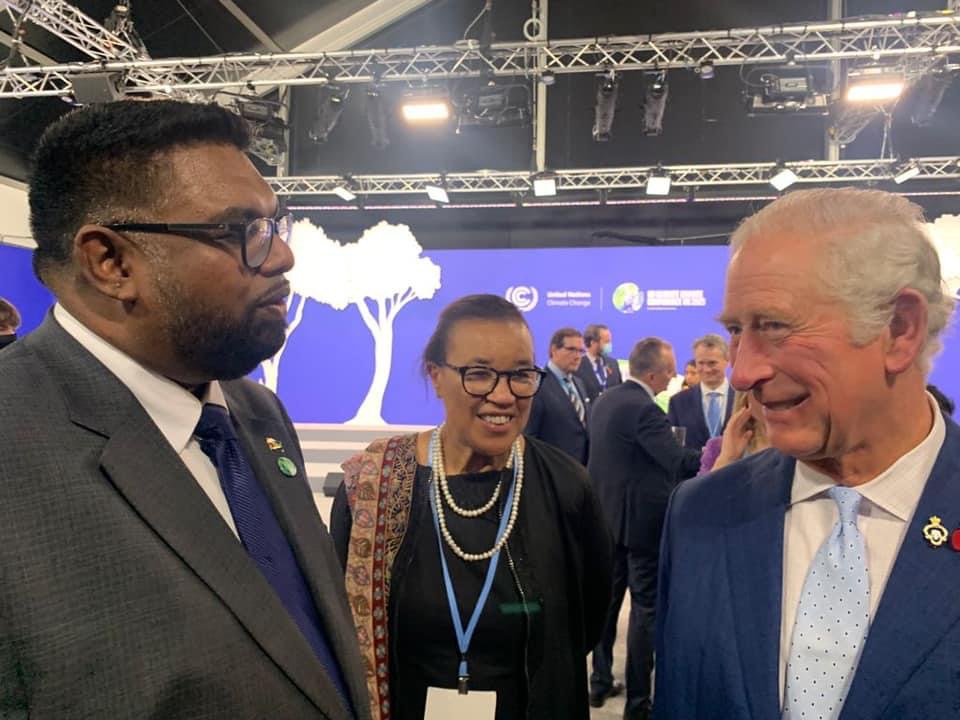Guyana is aiming to reduce its carbon emissions by 70% by 2030, President Irfaan Ali today told the UN COP26 climate conference underway in Scotland.
Georgetown has not gone to this crucial conference with a Nationally Determined Contribution which sets out climate related targets for greenhouse gases emissions reductions, policies and measures. The President’s statement at this point is therefore just an oral commitment in the wake of major announcements by other countries.
The President called for urgent action: “We are at a historic moment in our civilization. History must not judge us as having only counted our losses. It must instead herald our efforts to confront one of our Planet’s greatest threats – climate change”.
The statement made by Ali follows:
Excellencies,
Ladies and Gentlemen
The fate of civilization resides in the decisions we make here in Glasgow. The climate crisis has issued us an ultimatum: either we take immediate and drastic action or subject ourselves to an infernal global disaster.
Indifference and inaction will be costly. Already, we are far behind in limiting temperature rise to 1.5 degrees Celsius. The coming decade therefore must be the decade of decisive action.
Climate change affects us all – rich, poor, developed and developing States – but its effects are more severe on the poorest and most vulnerable – especially Small-island Developing States (SIDS) and low-lying coastal States. For us it is a question of survival.
We can use this Summit to change the present trajectory. Immediate action is needed on three fronts:
First, we must set more ambitious goals to reduce emissions, and we must honour, to the letter, those ambitions. All countries have an obligation to act but the world’s foremost polluters have a greater duty to institute steeper emission cuts.
Second, the pledge of US$100B per annum, made one decade ago, to support climate action must be met. Dishonoured pledges are a recipe for disaster.
Third, forests constitute a powerful arsenal in the fight against climate change. Forest-rich countries must be provided with the incentives necessary to keep their forests intact and to reduce deforestation and forest degradation. Mindful that deforestation contributes 16% to annual global emissions and in recognition of the ecosystem and climate services provided by forests, it is imperative that we finalise the rules for carbon markets and REDD+ so as to properly value tropical forests and the climate services which they provide.
Guyana
My country, Guyana is already playing its part in addressing climate change and will continue to do so:
We will maintain our forests – almost the size of England and Scotland combined, storing 20 Gigatons of carbon – as a global asset.
We will work with local communities in conserving, protecting and sustainably managing our forests, biodiversity and freshwater supplies.
We will decouple economic growth and emissions through a progressively cleaner energy mix, with the aim of reducing our carbon emissions by 70% by 2030.
We will invest in low carbon opportunities for jobs, ecosystem services and social inclusion through an expanded Low Carbon Development Strategy.
Action
We are at a historic moment in our civilization. History must not judge us as having only counted our losses. It must instead herald our efforts to confront one of our Planet’s greatest threats – climate change.
In this regard, Guyana is prepared to work with international
community for collective action. We support the position of
Caricom and are aligned with the Alliance for Small Island States
(AOSIS), the Community of Latin America and Caribbean States
[CELAC], the Leticia Pact, the DHAKA-Glasgow Declaration and
the Glasgow Leaders’ Declaration on Forest and Land Use,
among others. Though we recently became an oil producer we
support the removal of subsidies from fossil fuel production and
advocate a strong global carbon price.
Let future generations say – when it mattered the most, we made a difference.
I thank you.

